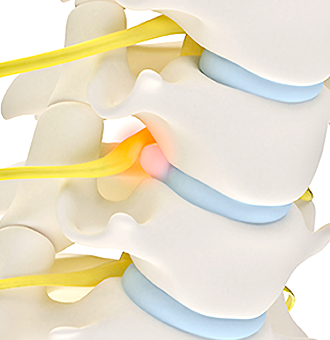What is a Herniated Disc?

A herniated disc can be a troublesome state of affairs. These round, rubbery structures keep the vertebrae from rubbing against one another. Just like a brake pad.
When a disc herniates, some of that soft structure protrudes through its exterior. Through the ruptured portion, the inner central portion of the disc (nucleus pulposus) is pushed out into the spinal canal. Typically on nerves in the cervical, lumbar thoracic areas. In fact, not all herniated discs require surgery. However, there are some factors that play into this.
Symptoms of a Herniated Disk:
Herniated disks are far more common in the lower back. Actually, a herniated disc can also occur in the neck too. Though sometimes asymptomatic, the most common symptoms include:
- Numbness and pain, most commonly on one side of the body
- Discomfort that extends to your arms or leg
- Pain that worsens at night or with certain movements
- Discomfort that worsens after standing or sitting
- Pain when walking short distances
- Unexplained muscle weakness
- Tingling, aching, or burning sensations in the affected area
Back pain varies from person to person. Although if pain persists seeking medical attention is advised.
Herniated Disc Causes:
Herniated disks are most often caused by time; natural degeneration and years of repetitive motions. Sometimes, age can create a drying-out of the disks themselves. Some of the risk factors are as follows:
- Weight
- Activity levels
- Genetics
Complications with a Herniated Disk:
Though most herniated disks are not particularly serious, some can be. Typically those which affect the cauda equina (the end of the spinal cord) just beneath the waist. Disc injury in this region has the potential to cause paralysis or permanent lifelong issues. If you suspect this, you should address it immediately.
Seek immediate medical assistance if you suffer from any of the following:
- Worsening symptoms (pain, weakness or tingling has reached a point that inhibits life’s activities).
- Incontinence. The cauda equina controls excretory functions and will manifest as such.
- Saddle anesthesia. If the area on the body which would rest on a saddle – the back of the legs, rectal area, and inner thighs – become numb, this can be a symptom of major issues with the cauda equina.
Diagnosing & Preventing a Herniated Disc:
The first step is to perform a few simple tests. This will allow the doctor to learn if you’re experiencing a herniation. Tests include a physical examination of the back. However, imaging tests are warranted, including X-rays and MRIs.
Fortunately preventing a herniated disk is easier than you might think! Losing excess weight, maintaining good posture and staying active can all help to keep your disks healthy.
Treatment for a Herniated Disc:
Most herniated disks are resolved with rest, a regimented exercise plan and pain medication. Few requiring physical therapy. Especially for those whose symptoms have not improved in more than six weeks.
Many physicians will prescribe pain medications to assist with recovery and comfort. Prescriptions such as:
- Corticosteroids
- Narcotics
- Anticonvulsants
- Over the counter medications such as Motrin, Advil or Tylenol
Very occasionally, surgery may be warranted to repair the damaged spinal disk. Particularly in those who experience long-term or severe side-effects such as difficulty standing or walking.
If you suspect you may have herniated a disk, don’t panic just yet – they’re easier to fix than you might have thought. A few choice lifestyle changes will have the problem eradicated in no time. And reduce the chance for reoccurrence.
If you are experiencing back pain without relief, call us today to visit a spine specialist near you, at 888-409-8006. Offices conveniently located in South Florida; Boca Raton, Deerfield Beach & Plantation.
